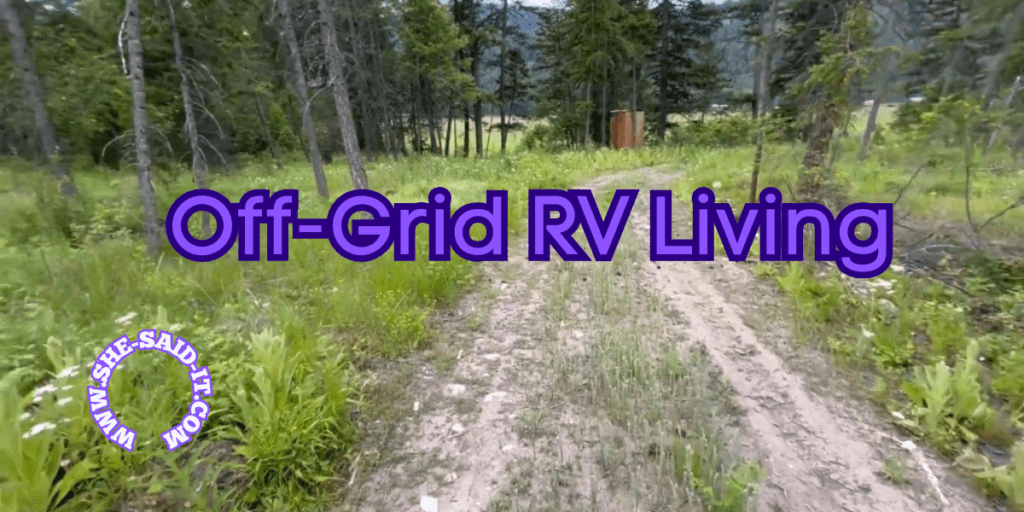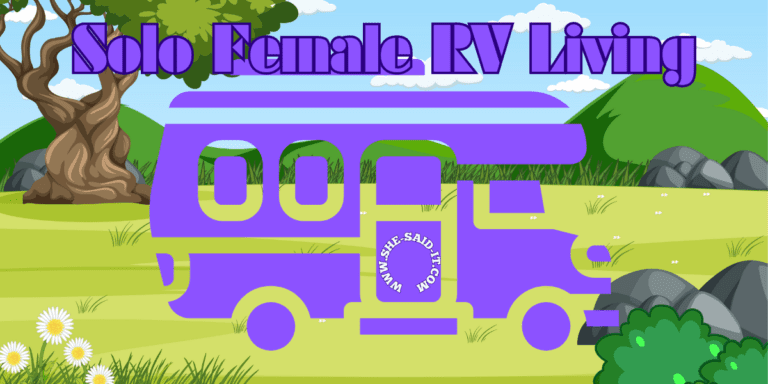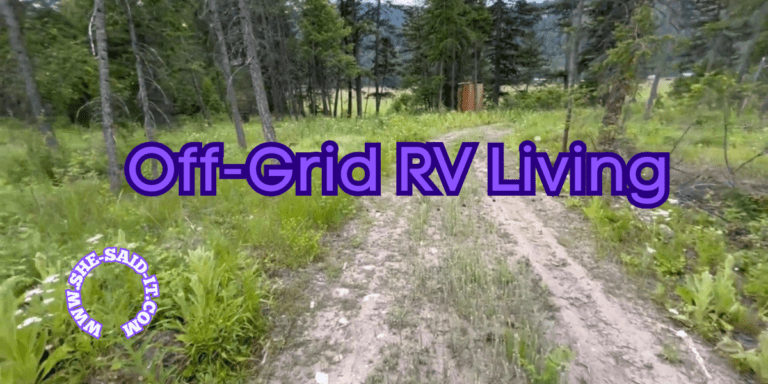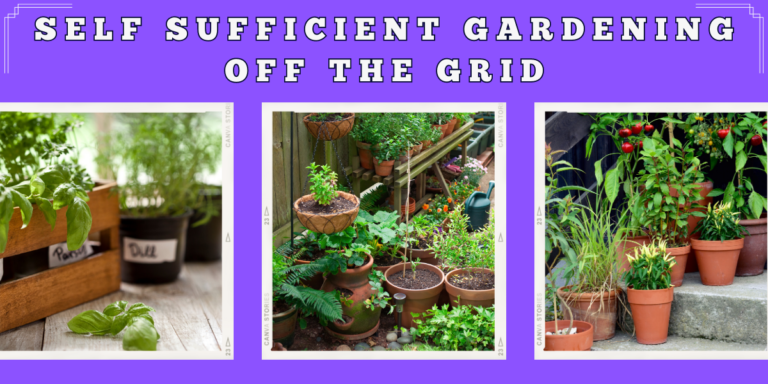Embracing Off-Grid RV Living: Your Utility Planning Guide

Powering, Hydrating, and Connecting your Off-Grid RV Living Oasis
Welcome to our multipart series documenting the journey of transforming unrestricted land into the ideal spot for full timing in your RV on your own property. In our first installment, we explored the steps to identify and acquire the perfect plot for your RV home. Now, as we journey into Part Two, we delve into the exciting yet challenging world of establishing essential utilities on your property.
This blog post aims to guide you through setting up your RV home with a focus on vital services like septic, water, and power. In the vast landscapes of Canada, providing reliable, off-grid utilities to your RV can be tricky but not impossible. We’ll also touch upon the hurdle of securing affordable and reliable internet service – a crucial need in our increasingly digital world.
Join us as we uncover the practical aspects of off-grid RV living,(check out our related post about geothermal heating and cooling) and navigate the paths towards creating your self-sufficient RV sanctuary amidst the beauty of unrestricted land.
Understanding the Basics: Septic, Water, and Power
When living off the grid RV style, it’s all about self-sufficiency. You’re designing your own septic system, setting up a water supply, and deciding on a power source. Each utility plays a crucial role in creating a comfortable, sustainable, and fully functional RV lifestyle.
The great thing about most RVs is that they are designed to be off-grid for long or short periods of time. Some have generators and solar panels which can extend your boondocking time frame by considerable amounts. This will give you a chance to land on your new piece of land and sort out your utilities on your own time line.
Planning Your Off-Grid RV Living Septic System
When going off the grid with your RV, the septic system becomes one of your top priorities. You want to ensure a clean, sanitary environment. Planning and designing a septic system suitable for RV use requires understanding local regulations and acquiring the necessary permits. This might seem daunting, but with the right approach, you’ll navigate it successfully. The hardest part might be finding someone who works in your remote location.
When you purchase a piece of unrestricted land chances are it’s far away from most of the companies that you would hire to deal with these things. It can be just as costly to install a single RV septic system as it is to have something installed that can handle 3-5 RVs. This is something you are going to have to do your own leg work on.
The piece of property that inspired this article is about an hour away from “civilization”. Finding someone to put in septic at a reasonable price is proving to be a bit challenging. We did however manage to find a septic truck that will empty the holding tanks for 40$ per RV. That’s a really reasonable price and while sorting out a more permanent solution this will work out just fine.
A Rustic Approach to Sanitation
Another option for your new rural RV location is an outhouse or privy. For those unfamiliar, an outhouse is a small structure that covers a pit toilet or a bucket-like container. It’s a simple, no-flush toilet solution that’s been in use for centuries.
A well-designed outhouse can be a cost-effective solution, significantly reducing the need for frequent septic tank maintenance. It’s also a great choice for those who want to limit their water usage – an essential consideration when you’re off the grid.
However, building an outhouse isn’t as straightforward as it might seem. There are regulations governing the construction and maintenance of outhouses to ensure they don’t contaminate nearby water sources. Always make sure to check the local rules and regulations in your area before you decide on this option.
Outhouses also require regular upkeep to control odors and keep away flies. Lime, wood ash, or commercially available products can be used to help break down waste and control the smell.
Though they might not be for everyone, outhouses provide an interesting, eco-friendly alternative to traditional septic systems for off-grid RV living. It’s all part of the charm and challenges of carving out your unique lifestyle on unrestricted land.
Ensuring Water Supply
Water is life, and this adage couldn’t be truer when living off-grid in your RV. While many of us are used to simply turning on a faucet and having instant access to water, the situation can be a bit more complicated when you’re living off the grid.
One of the most common solutions to this problem is to have a well on your property. Wells have been used as a source of water for thousands of years, and with modern drilling techniques, it’s often possible to access water even in locations that may seem too dry or inhospitable.
If you’re buying a piece of land that already has a well, you’re off to a good start. But don’t just assume that because a well exists, it’s good to go. In British Columbia, for instance, a crucial part of the buying process is having the well water tested to ensure it meets local water regulation standards. Your financial institution likely won’t lend you money unless this test has been done and the water has been deemed safe.
The testing process usually involves taking a water sample and having it tested in a laboratory for a variety of factors including pH, nitrates, total dissolved solids, and any potential contamination from bacteria like E. coli. This is essential to ensure that the water is safe for drinking, cooking, bathing, and other uses.
But what if your property doesn’t have a well? In that case, you’ll need to have one drilled. The process of drilling a well involves a lot of factors. You’ll need to consider the depth of the well, the type of soil or rock in your area, the location of the water table, and the yield of the well, among other things. It’s usually best to consult with a local well-drilling company, as they’ll have experience with the specific conditions in your area.
Remember, the installation of a well can be a significant investment, but it’s one that’s crucial for your off-grid lifestyle.
Once your well is up and running, it’s not a set-it-and-forget-it situation. Wells require regular maintenance and testing to ensure that they continue to provide safe, clean water.
Arranging Power Supply
Living off-grid in an RV is a unique lifestyle choice that can bring immense joy and freedom. However, it doesn’t mean you have to forego electricity. You’ll still need power to run your appliances, charge your devices, and enjoy the comforts of modern living. Thankfully, there are several options available, each with its advantages and drawbacks. Let’s explore them in more detail:
- Grid-Tied Power: If your land is located near existing power lines, hooking up to the grid may be the most straightforward way to get electricity. Grid-tied power offers reliable, 24/7 access to electricity, and you won’t have to worry about running out of power on cloudy days or when your energy usage spikes. On the downside, there will be recurring costs, and you’ll be dependent on the power company. Also, the initial setup for grid connection can be quite costly, depending on the distance from the nearest power line. It’s also worth noting that this option might not be feasible for remote properties.
- Solar Power: For true off-grid RV living, solar power is the go-to option. With an array of solar panels, you can harness the abundant energy of the sun to power your RV and any additional structures you have. Solar power is renewable, eco-friendly, and, after the initial investment, essentially free. However, it’s important to consider the climate and location. Solar power depends heavily on sunlight, so if you’re located in a region with long winters or heavy cloud cover, you might not be able to generate enough electricity. Solar panels also require space for installation and, depending on your energy needs, you may need a large array. Check out my blog post about RV solar power.
- Wind and Hydro Power: If your property has the right conditions, wind or hydro power could be an option. These systems work similarly to solar power but harness the power of the wind or a stream/river instead. Like solar power, they are eco-friendly and offer an ongoing source of free electricity after the initial setup. However, these systems are highly dependent on local conditions – you need a consistent and strong wind for a wind turbine, and a year-round, fast-flowing water source for hydro power.
- Generator: If your looking for something that can offer an immediate and substantial power source for off-grid RV living, perfect for running multiple appliances simultaneously. However, generators can be noisy and require regular maintenance and refuelling. Inverter generators, a modern alternative, are quieter and fuel-efficient, providing cleaner power. The ideal power solution often involves a combination of options to meet individual needs and lifestyles.
It took a couple of phone calls to start the ball rolling to get power to the property that I purchased in a remote area of BC. I’ll need to hire an electrician who will then coordinate with the local power supply company to put in a couple of temporary power meters and supply lines. The power company will be charging just under 300$ and I will need to get an estimate from a licensed electrician when I take possession of the property in a few weeks. Don’t forget to sign up for our email list we offer great discount codes on solar power systems.
The Challenge of Internet Services
Living off-grid doesn’t necessarily mean going offline. Despite the limited data and high costs of internet services in Canada, there are ways to ensure you stay connected, whether for work, communication, or entertainment. Let’s explore some of these options:
- Mobile Hotspots: Your smartphone can be your internet savior when living off-grid. Most mobile plans allow for tethering or the creation of a Wi-Fi hotspot. This means you can share your phone’s cellular data with your other devices, like laptops or tablets. The downfall? Canadian data plans can be expensive and come with data caps. So, if your internet needs are extensive, this might not be the most cost-effective option. Still, it’s a great choice for light internet users who primarily browse the web or check emails.
- Satellite Internet: Satellite internet is an excellent option for remote locations where traditional internet services aren’t available. Starlink, operated by SpaceX, is a popular choice for off-grid RV living. Their network of low orbit satellites promises to deliver high-speed broadband internet to locations where access has been unreliable, expensive, or completely unavailable. However, you need a clear view of the sky for the best service, and bad weather can sometimes disrupt your connection. As Starlink is still in its early days, availability might be limited, but the network is expanding. The service is more expensive than traditional options, but for those in need of reliable, high-speed internet, it could be well worth the investment.
- Boosters and Antennas: If you’re parked in a location that has some cell service, but it’s weak or unreliable, a cell signal booster or a dedicated high-gain antenna can help. These devices work by boosting or directing the available cellular signal, improving your mobile hotspot’s performance. Remember, these devices improve existing signals – they can’t create a signal where none exists.
- RV Internet Service Providers: Some companies offer internet services specifically tailored for RV dwellers, offering a combination of mobile and Wi-Fi services. They’re designed with the needs of RV dwellers in mind, so they might offer a better balance of cost, data limits, and performance.
- Public Wi-Fi: Many cafes, libraries, and even some public parks offer free Wi-Fi. While it’s not a reliable daily solution, it can be helpful when you need to download large files or update your devices.
Getting connected when living off-grid in an RV in Canada is challenging and expensive but it’s certainly not impossible. The best solution will depend on your location, your internet needs, and your budget. Whether it’s leveraging your mobile data, installing a satellite dish, or combining various options, you can find a way to stay connected while enjoying the off-grid RV lifestyle. I joined a few facebook groups that are specific to my new neighbourhood, did a search for ‘internet’ in the groups and found the providers available in the area.
Conclusion
So there you have it! Setting up utilities for your off-grid RV lifestyle involves some work, but with careful planning and execution, you’re well on your way to making your dream a reality. Stay tuned for our next post where we’ll delve further into these aspects and provide more detailed tips. I can’t wait to get out to my new property and take some pictures of the process.
Remember, every step you take is a move towards freedom – the freedom to live where you want, how you want. The off-grid RV living lifestyle is within reach. Keep that spirit of adventure alive and enjoy the journey.
Off Grid Wish List
Solar Bug Zapper
4 Pcs Solar Bug Zapper Waterproof Outdoor Mosquito Zapper Mosquito Killer and Lighting Mosquito Repellent Lamp for Indoor Outdoor Use Garden Patio, Purple and White Light
When you are living off grid, it’s important to find great products that harness the energy of the sun.
Solar Bug Zapper
Mosquito Zapper Indoor Outdoor Waterproof, LED Rechargeable High Powered Electric Mosquito Killer for Patio, Backyard, Camping, Home, Kitchen, Up to 2100 Sq Ft Coverage
this product has solar and usb charging. I can’t wait to try it and post a review.

Ice Cube Tray with Lid and Bin
not necessa5







